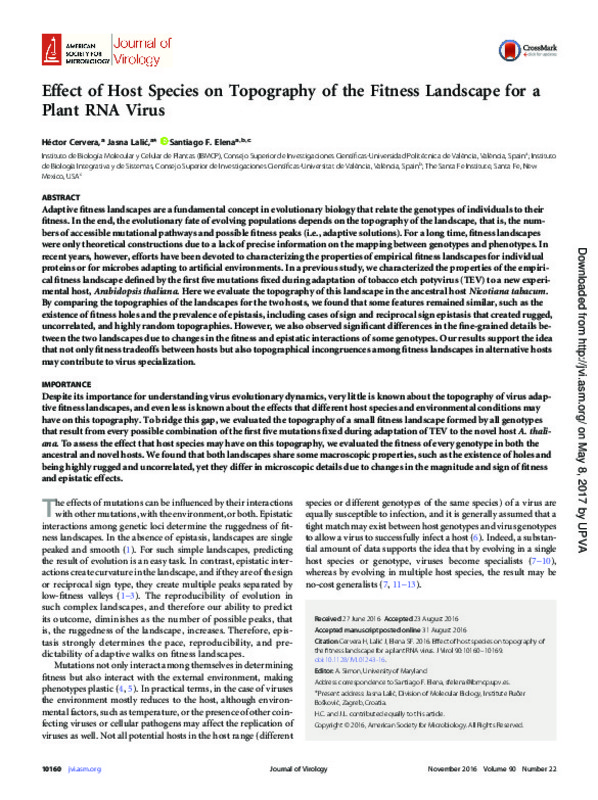JavaScript is disabled for your browser. Some features of this site may not work without it.
Buscar en RiuNet
Listar
Mi cuenta
Estadísticas
Ayuda RiuNet
Admin. UPV
Effect of host species on the topography of fitness landscape for a plant RNA virus
Mostrar el registro sencillo del ítem
Ficheros en el ítem
| dc.contributor.author | Cervera-Benet, Héctor
|
es_ES |
| dc.contributor.author | Lalic, Jasna
|
es_ES |
| dc.contributor.author | Elena Fito, Santiago Fco
|
es_ES |
| dc.date.accessioned | 2017-05-08T12:13:26Z | |
| dc.date.available | 2017-05-08T12:13:26Z | |
| dc.date.issued | 2016-11 | |
| dc.identifier.issn | 0022-538X | |
| dc.identifier.uri | http://hdl.handle.net/10251/80741 | |
| dc.description.abstract | [EN] Adaptive fitness landscapes are a fundamental concept in evolutionary biology that relate the genotype of individuals with their fitness. At the end, the evolutionary fate of evolving populations depends on the topography of the landscape, that is, the number of accessible mutational pathways and of possible fitness peaks (i.e, adaptive solutions). For long time, fitness landscapes were only theoretical constructions due to a lack of precise information on the mapping between genotypes and phenotypes. In recent years, however, efforts have been devoted to characterize the properties of empirical fitness landscapes for individual proteins or for microbes adapting to artificial environments. In a previous study, we had characterized the properties of the empirical fitness landscape defined by the first five mutations fixed during adaptation of tobacco etch potyvirus (TEV) to a new experimental host, Arabidopsis thaliana. Here we evaluate the topography of this landscape in the ancestral host Nicotiana tabacum. Comparing the topographies of the landscape in the two hosts, we found that some features remain similar, such as the existence of fitness holes and the prevalence of epistasis, including cases of sign and of reciprocal sign that create rugged, uncorrelated and highly random topographies. However, we also observed significant differences in the fine grained details among both landscapes due to changes in the fitness and epistatic interactions of some genotypes. Our results support the idea that not only fitness tradeoffs between hosts but also topographical incongruences among fitness landscapes in alternative hosts may contribute to virus specialization. | es_ES |
| dc.description.sponsorship | This project was funded by grants BFU2012-30805 and BFU2015-65037P from the Spanish Ministry of Economy and Competitiveness (MINECO), PROMETEOII/2014/021 from the Generalitat Valenciana, and EvoEvo (ICT610427) from the European Commission 7th Framework Program to S.F.E. H.C. was supported by contract BES2013-065595 from MINECO. J.L. was supported by a JAE-pre contract from CSIC. | en_EN |
| dc.language | Inglés | es_ES |
| dc.publisher | American Society for Microbiology | es_ES |
| dc.relation.ispartof | Journal of Virology | es_ES |
| dc.rights | Reserva de todos los derechos | es_ES |
| dc.title | Effect of host species on the topography of fitness landscape for a plant RNA virus | es_ES |
| dc.type | Artículo | es_ES |
| dc.identifier.doi | 10.1128/JVI.01243-16 | |
| dc.relation.projectID | info:eu-repo/grantAgreement/EC/FP7/610427/EU/Evolution of Evolution/ | es_ES |
| dc.relation.projectID | info:eu-repo/grantAgreement/MINECO//BFU2012-30805/ES/EVOLUTIONARY SYSTEMS VIROLOGY: EPISTASIS AND THE RUGGEDNESS OF ADAPTIVE LANDSCAPES, MUTATIONS IN REGULATORY SEQUENCES, AND THE HOST DETERMINANTS OF VIRAL FITNESS/ | es_ES |
| dc.relation.projectID | info:eu-repo/grantAgreement/MINECO//BFU2015-65037-P/ES/EVOLUCION DE VIRUS EN HUESPEDES CON SUSCEPTIBILIDAD VARIABLE: CONSECUENCIAS EN EFICACIA Y VIRULENCIA DE CAMBIOS EN LAS REDES INTERACTOMICAS DE PROTEINAS VIRUS-HUESPED/ | es_ES |
| dc.relation.projectID | info:eu-repo/grantAgreement/GVA//PROMETEOII%2F2014%2F021/ES/Comparative systems biology of host-virus interactions/ | es_ES |
| dc.relation.projectID | info:eu-repo/grantAgreement/MINECO//BES-2013-065595/ES/BES-2013-065595/ | es_ES |
| dc.rights.accessRights | Abierto | es_ES |
| dc.contributor.affiliation | Universitat Politècnica de València. Instituto Universitario Mixto de Biología Molecular y Celular de Plantas - Institut Universitari Mixt de Biologia Molecular i Cel·lular de Plantes | es_ES |
| dc.description.bibliographicCitation | Cervera-Benet, H.; Lalic, J.; Elena Fito, SF. (2016). Effect of host species on the topography of fitness landscape for a plant RNA virus. Journal of Virology. 90(22):10160-10169. https://doi.org/10.1128/JVI.01243-16 | es_ES |
| dc.description.accrualMethod | S | es_ES |
| dc.relation.publisherversion | http://dx.doi.org/10.1128/JVI.01243-16 | es_ES |
| dc.description.upvformatpinicio | 10160 | es_ES |
| dc.description.upvformatpfin | 10169 | es_ES |
| dc.type.version | info:eu-repo/semantics/publishedVersion | es_ES |
| dc.description.volume | 90 | es_ES |
| dc.description.issue | 22 | es_ES |
| dc.relation.senia | 323460 | es_ES |
| dc.identifier.pmcid | PMC5105653 | en_EN |
| dc.contributor.funder | European Commission | |
| dc.contributor.funder | Ministerio de Economía y Competitividad | |
| dc.contributor.funder | Generalitat Valenciana |








